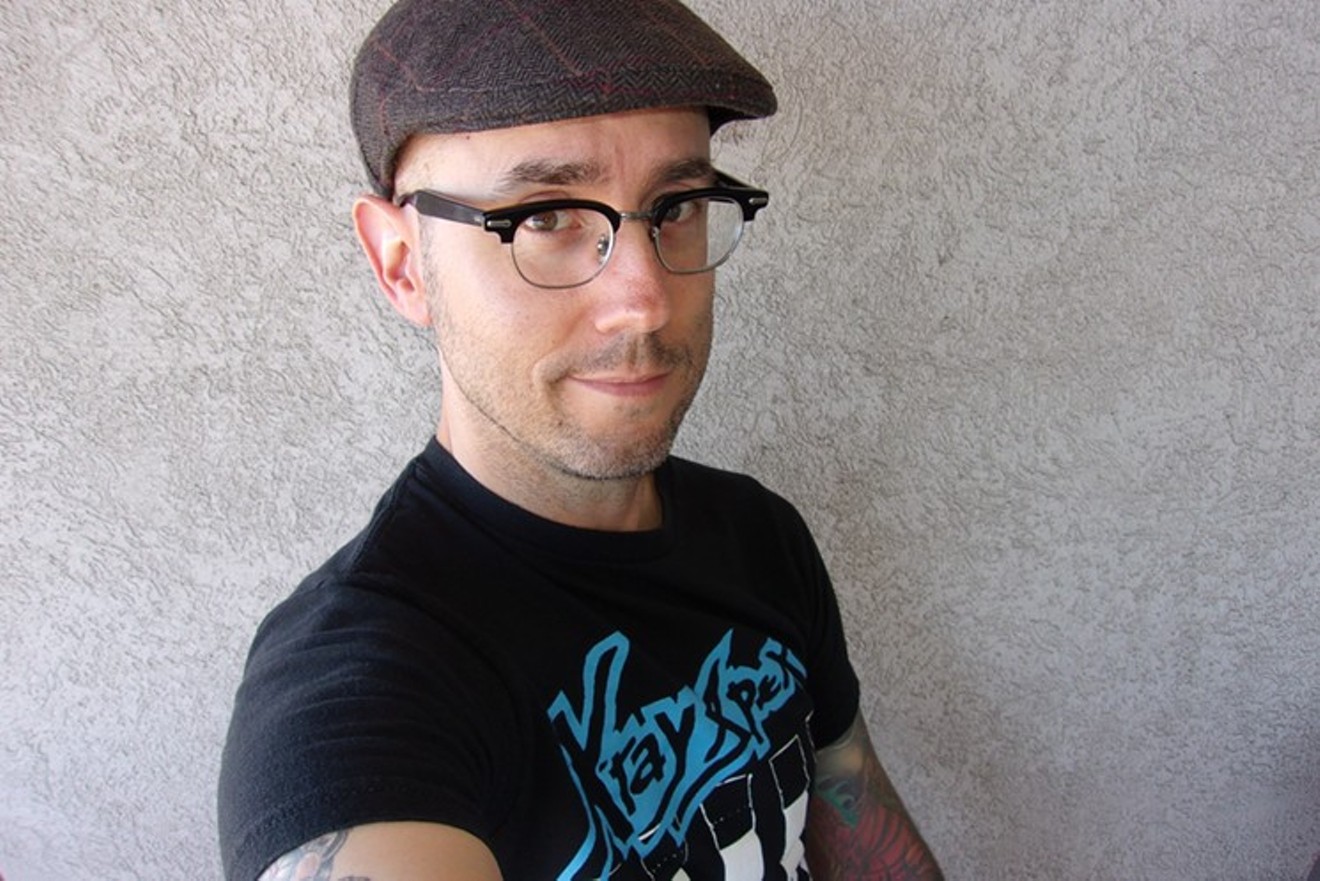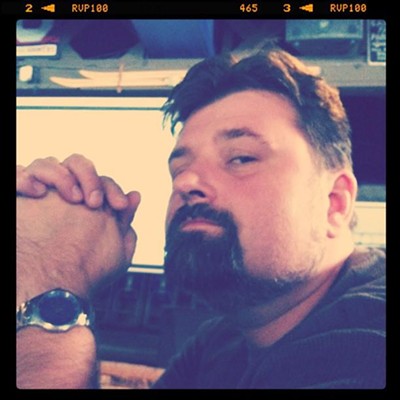Jason Heller is something of a nerd Renaissance man. He’s managed a comic-book store. He’s written about music and pop culture. He worked at Wax Trax, and he’s in the post-punk band Weathered Statues. He wrote an alt-history novel (Taft 2012), a Goosebumps book (Slappy's Revenge) and a book about Captain Jack Sparrow from Pirates of the Caribbean. And now he’s written something that brings together the music and the nerdity: Strange Stars: David Bowie, Pop Music, and the Decade Sci-Fi Exploded.
We recently took the opportunity to talk to Heller, who has written for Westword and a number of national publications, about his book, his writing, his nerd cred, and the way it was all cultivated right here in the Mile High.
Westword: First off, please tell me that you own the original Butcher Billy art for the cover of Strange Stars. It's just striking, from the face of Bowie to the font of the title, which was clearly a take-off on the old ’60s-era Star Trek or comics. It is a nigh-perfect cover image for Strange Stars; reassure me that authors get to keep a copy of the art from their books. That's a thing, right?
Jason Heller: I do not own the original art! I didn't even have anything to do with the decision to hire Butcher Billy to do the cover illustration, which was a decision made entirely, and wisely, by Melville House. When I saw that cover for the first time, I squealed. And, yes, that font is taken from the Star Trek comics published by Gold Key in the ’70s, which couldn't be a more fitting aesthetic for Strange Stars. Anyway, Butcher Billy gets to keep his original art when it comes to projects like these, although I could always ask him if he'll sell it to me. Maybe he'll give me a discount.
Strange Stars has a line early on that struck me as something a lot of gen-X music fans probably felt back in January 2016: "I can't remember a world without David Bowie in it." Except of course, now we've had to. With Bowie, with Tom Petty, with Prince and too many others. What is it about Bowie and celebrities of his elevation in the musical stratosphere that makes their passing so personal?
We see reality through their music. It changes the way we perceive the world and ourselves. It helps us contain and define, and it helps us expand and wonder. But it's more than their artistry, it's their ubiquity. Artists of that stature, if we let them into our lives, take up a huge part of our psyche — especially when they have careers and catalogues as sprawling as Bowie's or Petty's or Prince's. In essence, their songs comprise a single, vast narrative, a musical saga. So when they die, the story ends. And that's as difficult to accept as the passing of the people themselves.
When you write a book, you generally can't fit all of the awesome information you glean in your research into the finished product. So what did you have to leave on the metaphoric cutting-room floor for Strange Stars? Was there a musician you'd have liked to have shoehorned in somehow but couldn't find a place for? A factoid of the mashup of sci-fi and music that you wanted to include? In other words, what does the director's cut of Strange Stars look like, if you had Stephen King-like editorial freedoms?
Indeed, there were all kinds of things I wanted to put in Strange Stars but just couldn't find the room for — or that would have too greatly disrupted the flow of the big story I was trying to tell. One was the 1970 song "Space Captain," by Joe Cocker, which was later covered by Barbra Streisand! Such a great little nugget of ’70s sci-fi music, but one that didn't really add to the narrative I was weaving. I also wish I could've written an entire book's worth of extra material about T. Rex's Marc Bolan, who is one of my heroes — but his story crosses over with fantasy even more than it does with science fiction, and a book about the fantasy-inspired music of the ’70s is a whole other kettle of fish! And one that I would love to see someone tackle.
Okay, absolutely mandatory Star Wars questions, rapid (blaster) fire-style: Opinion of the prequels? What about the sequels? Favorite action figure? Ship? Playset? And once and for all: Did Han shoot first?
Ha! Well, I saw Star Wars in 1977, at the age of five, so I have spent maybe way too much time pondering such things — to the point where I wonder if maybe we all ponder them a little too much. In a nutshell, though: I love the sequels, I think the prequels are underrated — people love to hate them for the sake of hating them, but there's still lots of good stuff in there — and my favorite toy will always be the X-Wing Fighter, which I didn't own until The Empire Strikes Back came out, which means I spent the time between Star Wars and Empire building my own crude approximation of an X-Wing Fighter out of LEGOs...and not a Star Wars line of LEGOs, just the regular ones! As for Han shooting first: We live in a quantum universe. Cause and effect and linearity are illusions.
You've written about music and pop culture for a number of outlets, from Westword to the New Yorker to Entertainment Weekly to Rolling Stone and lots more. Is the gig pretty much always the same, no matter the outlet, or does the experience of writing for a publication change for you with each individual publication itself?
You definitely have to tailor your voice and format to a certain degree when switching from publication to publication as a freelancer. But for the most part, it seems editors want to hire me because of what I am already known for bringing to the table, so I don't find myself having to worry about wearing different hats as much anymore. That said, it's a great skill for an up-and-coming freelance writer to learn: How to maintain your voice while being flexible and accommodating to different editors and audiences.
There's an apocryphal rule in comic books that the best era in comics was whenever you were twelve years old. Strange Stars mentions a lot of your musical influences and your sci-fi roots, too, but what else did you love as a an eleven- to fourteen-year-old kid? What cartoons, fantasy novels, toys, even comic books fueled your imagination back then?
Hoo boy. I was between eleven and fourteen in the years 1983 through 1986. That was the time David Eddings's fantasy series The Belgariad began, and I devoured those books with a passion. I was nuts for Transformers. Cartoon-wise, I loved the Saturday morning science fiction of Kidd Video, Mighty Orbots, SilverHawks, ThunderCats, and of course He-Man. I was also a huge Dungeons & Dragons player then. But comics were a massive part of my life at the time, and I was a diehard Marvel fan at that age: X-Men, Alpha Flight, West Coast Avengers. I just couldn't get enough.
What's your favorite truly-bad-but-still-love-it science fiction/fantasy flick?
Krull. No question. It's terrible. But its mix of science fiction and fantasy is so incredible, and there's a power to some of those scenes and characters and designs that continues to haunt my imagination.
You mention being an "alumnus" of Wax Trax in the acknowledgements. What other Denver institutions helped educate you or were otherwise necessary for your survival and happiness over the years?
Yes, I worked at Wax Trax for a decade in the ’90s and early ’00s. It was a real education for me, music-wise, and I can't imagine writing Strange Stars without all those years of experience. As for other Denver institutions... all the coffee shops I frequented as a kid and young adult, whether still in existence or defunct: St. Mark's, Muddy's, Paris on the Platte. The legendary Denver punk venue the Raven was where I came of age as a musician in the mid-’90s. Tattered Cover, of course, has always been there to encourage my literary leanings. I also used to work for Mile High Comics, first in their warehouse then later as the manager of their store on Colorado Boulevard in the early ’90s. Every geeky inclination I've ever had has been catered to by Denver over the decades, and I am very lucky for that.
Back to the book before we close: If you could interview David Bowie right now, from the great beyond — what would you ask him?
I would ask him to please, please, please dig up "Black Hole Kids," a song he recorded for his 1972 sci-fi album, The Rise and Fall of Ziggy Stardust and the Spiders From Mars. He mentioned it a couple times in interviews over the years, usually in a totally and maddeningly offhand way, and for all we know, it could be the lost chapter of the Ziggy Stardust saga. And it may very well be sitting in a storage locker somewhere, covered in dust.
And what do you think he'd say about Strange Stars?
If he were alive, I don't think he'd say anything about Strange Stars; he seemed above trying to acknowledge all the hundreds of books that have been written about him. But I'd like to think he'd secretly smile at it.
See Jason Heller at 7 p.m. Tuesday, July 3, at a discussion of his book and a screening of A Clockwork Orange at the Sie FilmCenter; at 6:30 p.m. Friday, July 6, at a talk about Strange Stars at Mutiny Information Cafe; or at 2 p.m. Saturday, July 7, at a combo book-signing/DJ set at the Central Denver Public Library. Find out more about Strange Stars at jasonhellerauthor.com.
[
{
"name": "Air - MediumRectangle - Inline Content - Mobile Display Size",
"component": "12017618",
"insertPoint": "2",
"requiredCountToDisplay": "2"
},{
"name": "Editor Picks",
"component": "17242653",
"insertPoint": "4",
"requiredCountToDisplay": "1"
},{
"name": "Inline Links",
"component": "18838239",
"insertPoint": "8th",
"startingPoint": 8,
"requiredCountToDisplay": "7",
"maxInsertions": 25
},{
"name": "Air - MediumRectangle - Combo - Inline Content",
"component": "17261320",
"insertPoint": "8th",
"startingPoint": 8,
"requiredCountToDisplay": "7",
"maxInsertions": 25
},{
"name": "Inline Links",
"component": "18838239",
"insertPoint": "8th",
"startingPoint": 12,
"requiredCountToDisplay": "11",
"maxInsertions": 25
},{
"name": "Air - Leaderboard Tower - Combo - Inline Content",
"component": "17261321",
"insertPoint": "8th",
"startingPoint": 12,
"requiredCountToDisplay": "11",
"maxInsertions": 25
}
]













